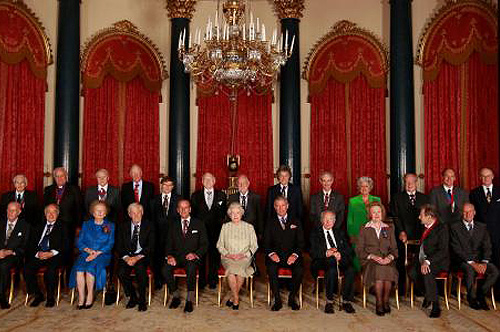The Order of Merit
THE MOST PRESTIGIOUS HONOUR awarded to British and Commonwealth citizens after the Victoria Cross (or civilian equivalent), the Order of the Garter (or national equivalent) and the Order of the Bath, is the highly exclusive Order of Merit. Because there are only 24 members allowed into the order at any one time, as is the case for the Garter, it is a rare day indeed to witness an actual investiture. Forget the omnipresent Al Gore and the annually bestowed Nobel Peace Prize. Look who got into the OM. Above: Members of the Order of Merit gather at St. James's Palace following a service of thanksgiving for the centenary of the Order, 31 October 2002. Whereas the 24 Knights of the Garter meet annually, the 24 members of the Order of Merit meet only once every five years. They gathered again below just yesterday.
Above: Members of the Order of Merit gather at St. James's Palace following a service of thanksgiving for the centenary of the Order, 31 October 2002. Whereas the 24 Knights of the Garter meet annually, the 24 members of the Order of Merit meet only once every five years. They gathered again below just yesterday.  The honour is all the more prestigious given the achievements of its members, and given that it is the personal award of the Sovereign. Here the Queen invests Sir Timothy Berners-Lee, inventor of the World Wide Web, with the Insignia of a Member of the Order of Merit at Buckingham Palace, 11 October 2007. The Order was founded in 1902 by King Edward VII and is awarded specifically to scientists, artists, musicians, writers and people active in public life.
The honour is all the more prestigious given the achievements of its members, and given that it is the personal award of the Sovereign. Here the Queen invests Sir Timothy Berners-Lee, inventor of the World Wide Web, with the Insignia of a Member of the Order of Merit at Buckingham Palace, 11 October 2007. The Order was founded in 1902 by King Edward VII and is awarded specifically to scientists, artists, musicians, writers and people active in public life. Another indication of its prestige is that new appointments are not announced in the annual Honours Lists, but are published separately as each appointment is made. The badge is usually presented by The Queen in a private audience at Buckingham Palace.
Another indication of its prestige is that new appointments are not announced in the annual Honours Lists, but are published separately as each appointment is made. The badge is usually presented by The Queen in a private audience at Buckingham Palace.  The Order is granted to members of Commonwealth realms as well as individuals from the UK. Recipients from the Commonwealth have included Mackenzie King and Lester Pearson from Canada (1947); painter Sidney Nolan (1983) and opera singer Dame Joan Sutherland (1991) from Australia; and the historian John Beaglehole from New Zealand in 1970.
The Order is granted to members of Commonwealth realms as well as individuals from the UK. Recipients from the Commonwealth have included Mackenzie King and Lester Pearson from Canada (1947); painter Sidney Nolan (1983) and opera singer Dame Joan Sutherland (1991) from Australia; and the historian John Beaglehole from New Zealand in 1970.
 Vice-Regal Saint:
Vice-Regal Saint: 








































.gif)

.gif)















































































































4 comments:
Who got it this year?
The inventor of the world wide web, Tomothy Berners-Lee. The OM is not given out every year, only when one of the 24 existing members passes on, which is the only way room is made for a new entry. As I say, it's a very exclusive honour.
And of course Mr. Mandela feels obliged to dress inappropriately for such occasions. But then he is even so casually represented in the form of a statue on Parliament Square. I hope the statue of Field Marshal Smuts scowls at him, or (more charitably, I suppose) whispers a word of sartorial advice.
I had always assumed those informal looking silk shirts of his were semi-traditional garb of some sort, but I'm going to plead ignorance on that one. As the only honorary member of the OM, I wonder what kept his casual self away this time?
Post a Comment